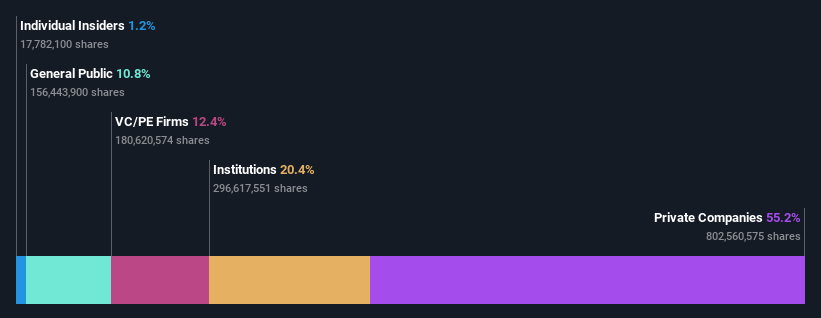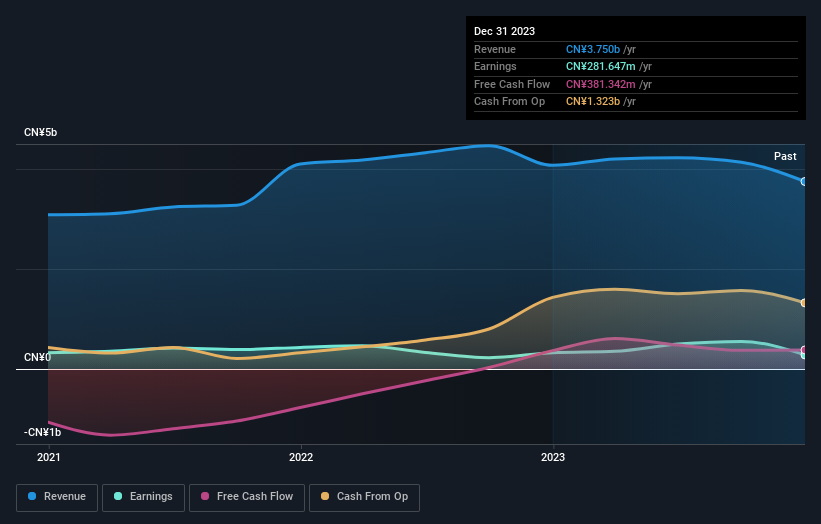Zheneng Jinjiang Environment Holding Company Limited's (SGX:BWM) top owners are private companies with 55% stake, while 20% is held by institutions
Key Insights
The considerable ownership by private companies in Zheneng Jinjiang Environment Holding indicates that they collectively have a greater say in management and business strategy
The top 2 shareholders own 52% of the company
Institutions own 20% of Zheneng Jinjiang Environment Holding
A look at the shareholders of Zheneng Jinjiang Environment Holding Company Limited (SGX:BWM) can tell us which group is most powerful. With 55% stake, private companies possess the maximum shares in the company. That is, the group stands to benefit the most if the stock rises (or lose the most if there is a downturn).
And institutions on the other hand have a 20% ownership in the company. Insiders often own a large chunk of younger, smaller, companies while huge companies tend to have institutions as shareholders.
Let's delve deeper into each type of owner of Zheneng Jinjiang Environment Holding, beginning with the chart below.
Check out our latest analysis for Zheneng Jinjiang Environment Holding
What Does The Institutional Ownership Tell Us About Zheneng Jinjiang Environment Holding?
Institutional investors commonly compare their own returns to the returns of a commonly followed index. So they generally do consider buying larger companies that are included in the relevant benchmark index.
As you can see, institutional investors have a fair amount of stake in Zheneng Jinjiang Environment Holding. This suggests some credibility amongst professional investors. But we can't rely on that fact alone since institutions make bad investments sometimes, just like everyone does. When multiple institutions own a stock, there's always a risk that they are in a 'crowded trade'. When such a trade goes wrong, multiple parties may compete to sell stock fast. This risk is higher in a company without a history of growth. You can see Zheneng Jinjiang Environment Holding's historic earnings and revenue below, but keep in mind there's always more to the story.
We note that hedge funds don't have a meaningful investment in Zheneng Jinjiang Environment Holding. The company's largest shareholder is Zhejiang Provincial Energy Group Company Ltd., with ownership of 30%. For context, the second largest shareholder holds about 23% of the shares outstanding, followed by an ownership of 15% by the third-largest shareholder.
A more detailed study of the shareholder registry showed us that 2 of the top shareholders have a considerable amount of ownership in the company, via their 52% stake.
While it makes sense to study institutional ownership data for a company, it also makes sense to study analyst sentiments to know which way the wind is blowing. As far as we can tell there isn't analyst coverage of the company, so it is probably flying under the radar.
Insider Ownership Of Zheneng Jinjiang Environment Holding
The definition of company insiders can be subjective and does vary between jurisdictions. Our data reflects individual insiders, capturing board members at the very least. Company management run the business, but the CEO will answer to the board, even if he or she is a member of it.
Insider ownership is positive when it signals leadership are thinking like the true owners of the company. However, high insider ownership can also give immense power to a small group within the company. This can be negative in some circumstances.
We can see that insiders own shares in Zheneng Jinjiang Environment Holding Company Limited. As individuals, the insiders collectively own S$5.8m worth of the S$473m company. Some would say this shows alignment of interests between shareholders and the board. But it might be worth checking if those insiders have been selling.
General Public Ownership
With a 11% ownership, the general public, mostly comprising of individual investors, have some degree of sway over Zheneng Jinjiang Environment Holding. While this size of ownership may not be enough to sway a policy decision in their favour, they can still make a collective impact on company policies.
Private Equity Ownership
Private equity firms hold a 12% stake in Zheneng Jinjiang Environment Holding. This suggests they can be influential in key policy decisions. Sometimes we see private equity stick around for the long term, but generally speaking they have a shorter investment horizon and -- as the name suggests -- don't invest in public companies much. After some time they may look to sell and redeploy capital elsewhere.
Private Company Ownership
We can see that Private Companies own 55%, of the shares on issue. It's hard to draw any conclusions from this fact alone, so its worth looking into who owns those private companies. Sometimes insiders or other related parties have an interest in shares in a public company through a separate private company.
Next Steps:
It's always worth thinking about the different groups who own shares in a company. But to understand Zheneng Jinjiang Environment Holding better, we need to consider many other factors. For example, we've discovered 4 warning signs for Zheneng Jinjiang Environment Holding (2 can't be ignored!) that you should be aware of before investing here.
Of course this may not be the best stock to buy. Therefore, you may wish to see our free collection of interesting prospects boasting favorable financials.
NB: Figures in this article are calculated using data from the last twelve months, which refer to the 12-month period ending on the last date of the month the financial statement is dated. This may not be consistent with full year annual report figures.
Have feedback on this article? Concerned about the content? Get in touch with us directly. Alternatively, email editorial-team (at) simplywallst.com.
This article by Simply Wall St is general in nature. We provide commentary based on historical data and analyst forecasts only using an unbiased methodology and our articles are not intended to be financial advice. It does not constitute a recommendation to buy or sell any stock, and does not take account of your objectives, or your financial situation. We aim to bring you long-term focused analysis driven by fundamental data. Note that our analysis may not factor in the latest price-sensitive company announcements or qualitative material. Simply Wall St has no position in any stocks mentioned.


